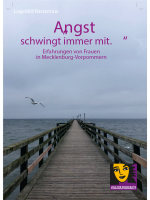Introduction
We here in M-V
Fear always resonates
The threatening thing about racism is its omnipresence. It manifests itself in all areas of life and is inevitably interwoven with everyday life. This omnipresence has an impact on the lives of people who are threatened by racism. The drama of the experience of barriers or the fear of a renewed confrontation with racism alone are almost inconceivable for people who belong to the so-called majority society. For example, they do not have to ask themselves whether they can go to certain public places - railway stations, cafés, playgrounds, the parents' council at nursery school or the canteen at their children's school - without exposing themselves to danger or violence.
It is an enormous privilege to be able to move freely in Mecklenburg-Western Pomerania without having to expose yourself to the risk of being endangered. Be it glances, remarks, insults or actual physical and psychological assaults - Mecklenburg-Western Pomerania is not a safe place for people with a refugee or migrant background.
In order to be able to analyse and understand the dimension of racism in more detail, we need the perspective of people who experience everyday and structural racism. This documentation visualises the results from the situation report on racism "Fear always resonates - experiences of women in MV", which was initiated by Tahera Ameer, Lola for Democracy/Board of the Amadeu Antonio Foundation by a research collective consisting of Lola for Democracy, Tutmonde e. V. (until January 2022 represented by Jana Michael) and the Neubrandenburg University of Applied Sciences (Prof. Dr Júlia Wéber; Prof. Dr Christine Krüger) 2020-21. The findings show how racism affects society as a whole from the perspective of those affected and what ways women in MV have developed to deal with it. The situation report was published in 2022 and the main contents are summarised in this web documentation.
Thanks to the interviewees
Thanks to the interviewees
The research collective would like to thank all the women from Mecklenburg-Western Pomerania who agreed to participate in the research project and shared their personal views and experiences as interviewees. The perspectives of the women involved are anonymised in this documentation and presented in the context of academic discourse.
Almost all of the participants felt uncomfortable for days after our interview, were agitated, irritable and also very sad. Many of them even cried during the interviews. Despite all this, everyone was convinced that people in Mecklenburg-Western Pomerania and throughout Germany must read our stories and learn about our perspectives, otherwise discrimination will never end.
Warning
Notice
The following stories contain racist content and deal with traumatizing experiences such as violence and exclusion.
